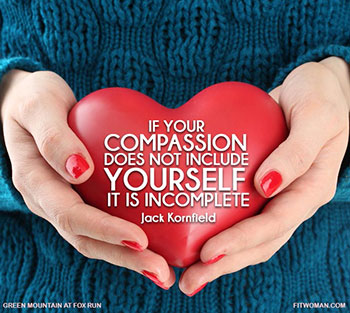 When was the last time you forgave yourself for something foolish that you said or did? Most likely you would have had a kinder reaction if someone else had said or done the same thing. It is not helpful to always listen to our inner critic and yet we do. Negative thoughts are normal but you do not have to continue to believe them! How often have we heard about the importance of having self -esteem? We have been told if we feel good about ourselves, we will be happier and more successful, right? I have learned that the concept of self- compassion is much more helpful and necessary.
When was the last time you forgave yourself for something foolish that you said or did? Most likely you would have had a kinder reaction if someone else had said or done the same thing. It is not helpful to always listen to our inner critic and yet we do. Negative thoughts are normal but you do not have to continue to believe them! How often have we heard about the importance of having self -esteem? We have been told if we feel good about ourselves, we will be happier and more successful, right? I have learned that the concept of self- compassion is much more helpful and necessary.
If we have high self -esteem, that might mean that we think we are above average and therefore, better than others. Instead if we learn to cultivate self- compassion, the result can lead to greater connection with others as well as ourselves. I believe we are all longing for greater connection to others and the focus on self -esteem can work against this.
We all know about the problem of bullying and cyber bullying with children. People who bully others suffer from low self- esteem and hurt others to feel better about themselves. While high self- esteem leads to a sense of disconnect with others, low self -esteem can lead to depression and cruelty to others.
We are often self -critical because we believe somehow this will motivate us to be better and to do better. And yet we know that when we encourage our children rather than criticize them, they are more likely to do what we’ve asked. We need to apply this same principle to ourselves.
Self –compassion is learning to treat yourself in the same way that you would treat someone you care about. I have often asked this question to clients, “If you treated your friends the way you treat yourself, would you have any?” So ask yourself if you have learned to embrace the quirks, failings, gifts and delights that constitute you?
Self -compassion involves 3 aspects:
- Treating yourself with kindness rather than your usual harsh judgment
- Seeing how we are similar to others. We are all imperfect. At times we may feel abnormal and separated from others. Self -compassion is an action that can actually connect us with others.
- The practice of Mindfulness which is learning to be with whatever is in the present moment.
To learn more about ways to increase your self- compassion, go to www.self-compassion.org and read Dr. Kristin Neff’s inspiring words about this important topic.
If you find yourself trying to cope with self -defeating thoughts and self- critical beliefs, please reach out to Methodist Healthcare EAP at 901-683-5658 to learn ways to grow in the practice of self -kindness. We are all wonderful and wounded in different ways. Together with your EAP counselor, you will become happier and healthier.
 Susan Erdman has a master's degree in pastoral studies from Loyola University in New Orleans and a master’s degree in social work from the University of Tennessee in Memphis. She has worked as an EAP counselor since the 1990s. Before her work in the EAP, she was a mental health specialist at Methodist University Hospital in the eating disorder and dual diagnosis programs.
Susan Erdman has a master's degree in pastoral studies from Loyola University in New Orleans and a master’s degree in social work from the University of Tennessee in Memphis. She has worked as an EAP counselor since the 1990s. Before her work in the EAP, she was a mental health specialist at Methodist University Hospital in the eating disorder and dual diagnosis programs.
